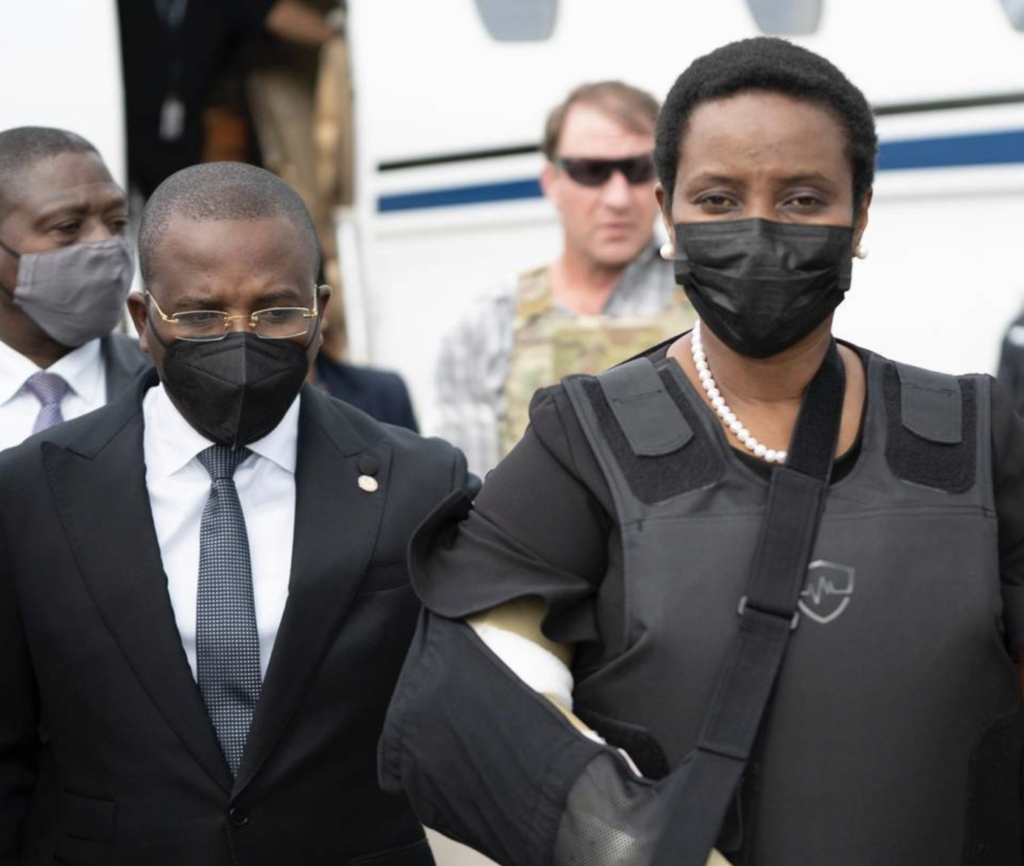Ten days after her husband, Haitian President Jovenel Moïse, was killed in a brazen middle-of-the-night attack inside their private residence, Haiti’s first lady Martine Moïse returned to Haiti Saturday.
Moïse, who was wounded in the arm during the attack, was medevaced on July 7 to Fort Lauderdale Executive Airport and immediately taken to Jackson Health System’s Ryder Trauma Center, where she underwent surgery.
Moïse’s right arm was in a sling when she stepped onto the tarmac at Toussaint Louverture International Airport at the end of a charter flight from Miami with members of her family. She was greeted by acting Prime Minister Claude Joseph and other members of her late husband’s administration.
Before leaving Miami, Moïse thanked the doctors and nurses at Jackson with a message posted to her personal Twitter account.
“Thank you to the team of guardian angels who helped me through this terrible time,” she said. “With your gentle touch, kindness and care, I was able to hold on. Thank you! Thank you! Thank you!”
On Friday, Joseph announced that planning was underway for a July 23 state funeral for the slain president. His burial will take place in the northern city of Cap-Haïtien, near where he was born and where he began his career as an entrepreneur. Martine Moïse is expected to help in the planning, along with a committee announced by the government.
More than 20 people have been arrested by Haitian police in connection with the attack, including 18 Colombian and five Haitians, several of whom have ties to South Florida.
While the investigation remains ongoing, questions linger about the night the president was killed and his wife attacked. Among them: What happened to the security guards assigned to them and how did the commandos manage to enter the private residence in the Pelerin 5 neighborhood with ease?
Haitian police say they are searching for several suspects, including five Colombian commandos who remain at-large and several Haitian nationals. Among those police are seeking is a former Haitian government employee in the anti-corruption unit, Joseph Felix Badio, who is accused of providing the mercenaries with arms, vehicles and money.
Five leaders of the president’s security team, including chief of security Dimitri Hérard, have been relieved of administrative duties and taken into custody. Two dozen agents have also been sanctioned.

The murder of the president, who had been ruling by decree since January 2020, has deepened Haiti’s political turmoil, with three men fighting to take charge of the country: the current acting prime minister, Claude Joseph; Prime Minister Designate Ariel Henry, tapped by the president days before his death to replace Joseph; and the current head of the Senate, Joseph Lambert.
At the same time, members of civil society and political parties, rejecting all three contenders, met Saturday to support a plan for a transitional government.
Representatives of several nations, pushing for elections before the end of the year, issued a joint statement Saturday encouraging Prime Minister-designate Ariel Henry to pursue the formation of an inclusive government.
The statement was signed by ambassadors of what is known as the Core Group — Germany, Brazil, Canada, Spain, the United States, France, the European Union, and the special representative of the Organization of American States and the special representative of the Secretary-General of the United Nations.
“As Haiti faces serious dangers, the members of the group express the wish that all political, economic and civil society actors in the country fully support the authorities in their efforts to restore security throughout the territory, including in areas currently plagued by gang violence, to hold free, fair, transparent and credible legislative and presidential elections as soon as possible, and to ensure that every citizen receives adequate services of the State,” the statement said.